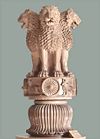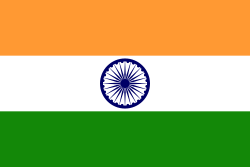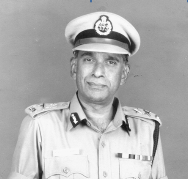|
Foreword by
David H. Bayley
Distinguished Professor, School of Criminal Justice,
State University of New York at Albany, New York, USA. |
|
I am delighted to have been asked to write a foreword to the
websites created to honor the accomplishments of C.V. Narasimhan
(C.V.) and N. Krishnaswamy (N.K.). They are legendary figures in
the modern Indian police. Although I will comment on some of their
history, I will write largely as a friend, colleague, and admirer.
It has been my enormous good fortune not only to be associated
with the Indian police, but to have been facilitated in my work by
insightful, dedicated, and far-sighted IPS officers such as C.V.
and N.K. Like them I have enjoyed the beauty of the old IPS
training academy at Mt.
Abu. From them I have learned a great
deal about the evolution of the Indian police since
Independence. And with them I have shared
the joys of friendship. Read full foreword
here. |
Biography of N. Krishnaswamy
N.Krishnaswamy (NK as he is often called by colleagues and friends) was born on 15-07-1925,
the second of four children, to
V.Natesan and Sivakamu, an orthodox Brahmin couple in Nemam village,
Thanjavur District in Tamilnadu. His parents belonged to the traditional
priestly class. His mother’s father, Natesa Sastry was a
Vedic teacher of such considerable
repute for his scholarship, that his pupils included one who was to become
the Paramacharya of the Kanchipuram Mutt.
NK’s father was the first in the family to
break out of the priestly profession of the family lineage. Taking to a
western style education, first at the local
High School at Tirukattupalli,
he went on for higher studies to the
St. Joseph’s College at Tiruchirapalli, where he
took his MA degree in Economics, with
the first rank in the University. His desire to get into the Indian Civil
Service, like a few of his contemporaries, was scotched by his father,
because of the prevailing religious taboo against going overseas. He had
therefore to content himself with qualifying for the next best public
service that was then
available, viz. the Financial Civil Service. After a brief stint as a
Lecturer in Economics in the Government College, Kumbakonam, he got
selected to the FCS, and this led him to a meteoric rise in the service of
the Government of India, capped by the prestigious British award of the
OBE in 1942, when at the age of 42, his career was tragically cut short by
cancer.
In 1925, when he was a baby 40 days old, NK’s mother carried him all the
way from Nemam to Peshawar, the northern-most tip of
what was then an undivided India and what is now in Pakistan. They
were to join his father who was then posted as the Deputy Controller of
the Military Finance Department at Peshawar. Those early years of NK till 1936,
were largely spent in places like Peshawar, Rawalpindi, Lahore and Karachi, all now in Pakistan. Thereafter till 1942, NK’s
father held senior positions in the Military Finance Department of the
Government of India, which meant living in New Delhi, with a summer time
shift to Simla, by the Government of India for four months every year to
avoid the heat of the Delhi summer. These postings meant NK finishing his
schooling in N.Delhi and Simla. After doing his Intermediate in the
Hindu
College, following his father’s death
in 1942, he had to return to Madras to be
with his mother, and finish his BSc at Loyola
College, Madras. But his love for
Delhi
remained so strong that he returned thereafter
to take his MSc from
Delhi
University in 1946.
Soon after finishing his MSc, NK
went to Bangalore to seek an entry into the Institute of Science,
Bangalore
to pursue a research career on which he had set his heart. But he failed
in that attempt, and was then wondering what to do next. He was staying
then at Bangalore with his classmate M.R.Raman who had by then
joined as a Lecturer in Chemistry in the newly started Vijaya College.
Raman took NK one morning to visit his college, and introduced him to his
Principal, Venkatesachar, who
promptly asked me whether NK would like to teach. When NK said he wouldn’t
mind trying, Venkatesachar took him
straight away to one of the classes which were then in session and asked
him to hold the class period on any topic of his choice. Still fresh with
his subjects from the MSc examinations, NK lectured to the class on
“Avogadro’s Hypothesis”. At the end of the class the clearly impressed
Principal announced to NK that he
could now consider himself part of
the College faculty ! This stint as a Lecturer in
Bangalore lasted one year, after which NK decided to resign and
return to Madras and take a shot at the first competetive
Examination for the newly constituted All-Inda Services that had
just then been announced by the Union Public Service Commission.
So that was what led NK finally into the Indian Police Service in 1948.
The 30 years that followed tili he retired in 1979 were eventful years of
personal and professional fulfillment.
The first significant event on the personal front was of course,
his marriage on the 30th April, 1950. His wife Meenakshi was
the second of three daughters of Lakshmi and N.Padmanabha Ayyar who bore
impressive family credentials. Lakshmi was the daughter of
Ulloor Parameswara Ayyar, the literary giant of Malayalam
literature, who was the Poet Laureate of
the erswhile Travancore
State that merged after Independence into the new
state of Kerala. Padmanabha
Ayyar himself took the First rank in the BE Examination of the Madras
University, by virtue of which he was automatically appointed to the
Indian Service or Engineers,
which was one of what was then
called the Secretary of State Services of
the British Government of
India. In an eventful
career he was associated with building the main Irrigation Dams of
Madras
Presidency and finally retired in 1956 as the Chief Engineer of Tamilnadu.
After retirement he went on to become Civil Engineering Adviser to the
Steel Ministry of the Government of India and in the five years that
followed, he laid the foundations (literally) of the first three major
Steel Plants of free India at Bhiilai, Rourkela and Durgapur.
In emaulation of her father, Meenakshi had taken the first rank
gold medal in the BA – Physics examination of
Madras University in 1949.
And after 20 years of marriage,
she resumed studies to take her BL degree, and became a lawyer to acquire
over the next 20 years, an impressive reputation
as one of the first women lawyers in the field of Income Tax Law.
All this, she accomplished all on her own, without the least interference
with her meticulous attention to bringing up their two children and
running the household. NK’s daughter Uma has today
shaped into one of the top Breast Surgeons of the country. His son,
Natesan, however was a sad story of a life crippled by severe disabilty, a
story that is narrated here.
The interesting details of NK’s long career and personal experiences in
the Police Service and in his retirement years thereafter in Social
Service are set out more
appropriately now in other pages of this website. Please browse
around and enjoy!
Foreword by
David H. Bayley
Distinguished Professor, School of Criminal Justice, State
University of New York at Albany, New York, USA.I am
delighted to have been asked to write a foreword to the websites
created to honor the accomplishments of C.V. Narasimhan and N.
Krishnaswamy. They are legendary figures in the modern Indian
police. Although I will comment on some of their history, I will
write largely as a friend, colleague, and admirer. It has been my
enormous good fortune not only to be associated with the Indian
police, but to have been facilitated in my work by insightful,
dedicated, and far-sighted IPS. officers such as C.V. and N.K.
Like them I have enjoyed the beauty of the old IPS training
academy at Mt.
Abu. From them I have
learned a great deal about the evolution of the Indian police
since Independence. And with
them I have shared the joys of friendship.
N.K. was the first of the two that I
met. It was in 1972, or possibly 1973, at the United Nations and
Far East Institute for the Prevention of Crime and the Treatment
of Offenders in Fuchu, Japan, a suburb of Tokyo. This training facility, more familiarly
known as UNAFEI, is run by the Japanese Ministry of Justice and
draws scholars and practitioners to seminars from all over Asia
and sometmes as far away as the Middle East and
Africa. N.K. was an invited participant from
India
and I was a lecturer from the
United States. I remember him not
only for his thoughtful and insightful comments about the role of
police in democratic societies, but also for the lovely sound of
his flute as he practiced in quiet corners of the UNAFEI grounds.
I met C.V. in the late 1970s when he
was Member Secretary of the National Police Commission
(1977-1981). The Commission, under the able leadership of Dharma
Vera, retired Governor of West Bengal,
had asked me contribute to its deliberations as a consultant. My
task was to explore the proper relationship between operational
police officers and elected political leaders. Not to be too
cynical, but it would appear that my efforts have made the
situation worse rather than better. When Mr Rustumji, Member of
NPC, later visited the United States,
my wife and I had the great pleasure of having him for dinner at
our home in Denver, Colorado.
When I returned to India
as the NPC was winding down, C.V. gave me an extensive personal
briefing on its main findings at the Commission’s office in New Delhi.
In the ensuing years I have been kept
up-to-date about C.V. and N.K. through the good offices of R.K.
Raghavan, another close IPS friend, who tries to bring us together
whenever I am in Chennai and C.V. and N.K. are not off doing good
work somewhere else in
India
or the world. Rest is not something that either of them practices
very much.
What is remarkable for me is that I
have had the opportunity to knowing personally two of the men who
integrated the IPS after Independence. Theirs was the generation of
officers who assumed responsibility for administering government
in India after the
British relinquished control. This was a daunting task after the
agony of Partition, the rigors of World War II, the recriminations
of the Independence struggle, and the need to nurture
and accommodate a new political class.
India
has justly celebrated several of these gifted administrators,
including Vallabhbhai Patel, after whom the
National Police Academy
in Hyderabad
is named. Because C.V. Narasimhan and N.Krishnaswamy are of that
venerable generation, we have a unique opportunity to learn what
it was like to “Indianize” the vaunted steel-frame government
during that momentous period.
Like C.V. and N.K. I have been
associated with the Indian police almost all of my professional
life. They, of course, as leaders and me only as an observing
scholar. I have been distressed by what I perceive as a decline in
the standards of Indian policing during my lifetime. Perhaps my
judgment romanticizes the past, but I know that C.V. and N.K.
share this concern. Unlike me, however, they have tried to do
something about it, by leadership, by personal example, and by
advocacy. Both have worked to implement the reforms
recommended by the Indian National Police Commission. As evidence
of their continued concern with policing, C.V. has recently
written a short paper about direct recruitment to the IPS, setting
the issue within the historical sweep of Indian policing since Independence and stipulating the principles
that should guide IPS leadership. Among his recommendations, C.V.
calls correctly for political neutrality of the police. He has
been too diplomatic, in my opinion, in not adding that Indian
politicians must learn to respect the operational and managerial
integrity of the IPS. C.V. knows this issue full well, having
wrestled with it throughout his career.
N.K. has added an insightful annexure
to C.V.’s paper about the importance of intelligence, in the
technical sense, in police work. Intelligence gathering, he
argues, has not utilized enough face-to-face interactions with the
public and has relied too much on specialized units, often
operating covertly. Police must learn to encourage cooperative
relations with the public in order to obtain more timely and
focused intelligence. He stresses the importance of developing the
analytic capability of police control rooms, which has remained
“rudimentary” in
India.
Writing such as these indicate why
C.V. and N.K. are role models indeed for young IPS officers.
One of the great privileges of my life
has been to know these two great police professionals. Our
association has not only been rewarding in terms of what I have
learned about the Indian Police, but has been fun. What more could
I have asked for?
David Bayley |
Back to Biography of N. Krishanswamy
|


